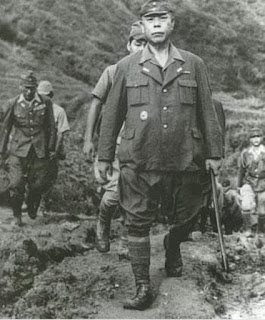The Surrender Of General Tomoyuki Yamashita aka "Tiger of Malaya
Tomoyuki Yamashita, Yamashita Tomoyuki, 8 November 1885 – 23 February 1946; also called Tomobumi Yamashita was a Japanese convicted war criminal and general in the Imperial Japanese Army during World War II.
Yamashita led Japanese forces during the invasion of Malaya and Battle of Singapore, his conquest of Malaya and Singapore in 70 days earned him the sobriquet "The Tiger of Malaya" and led to the British Prime Minister Winston Churchill calling the ignominious fall of Singapore to Japan the "worst disaster" and "largest capitulation" in British military history.
Yamashita was assigned to defend the Philippines from the advancing Allies later in the war. Although he was unable to prevent the superior Allied forces from advancing, despite dwindling supplies and Allied guerrilla action, he was able to hold on to part of Luzon until after the formal Surrender of Japan in August 1945.
After the war, Yamashita was tried for war crimes committed by troops under his command during the Japanese defense of the occupied Philippines in 1944.
Yamashita denied ordering those war crimes and denied having knowledge that they even occurred. Conflicting evidence was presented during the trial concerning whether Yamashita had implicitly affirmed commission of these crimes in his orders and whether he knew of the crimes being committed. The court eventually found Yamashita guilty and he was executed in February, 1946.
The ruling against Yamashita – holding the commander responsible for subordinates' war crimes as long as the commander did not attempt to discover and stop them from occurring – came to be known as the Yamashita standard.
The Yamashita Trial Commission. From left to right: Major General Leo Donovan, Brigadier General Morris C. Harwerk, Major General Russel B. Reynolds, Brigadier General Egbert F. Bullens, and Major General James A. Lester
Former war crimes prosecutor Allan A. Ryan has argued that by order of General MacArthur and five other generals, and the Supreme Court of the United States, Yamashita was executed for what his soldiers did without his approval or even prior knowledge. The two dissenting Supreme Court Justices called the entire trial a miscarriage of justice, an exercise in vengeance, and a denial of human rights.
Execution
On 23 February 1946, Yamashita was hanged at Los Baños, Laguna Prison Camp, 30 miles (48 km) south of Manila. After climbing the thirteen steps leading to the gallows, he was asked if he had a final statement. The Arizona Republic alleges that his reply, through a translator, was thus:
As I said in the Manila Supreme Court that I have done with my all capacity, so I don't ashame [sic] in front of the gods for what I have done when I have died. But if you say to me 'you do not have any ability to command the Japanese Army' I should say nothing for it, because it is my own nature. Now, our war criminal trial going under your kindness and right. I know that all your American and American military affairs always has tolerant and rightful judgment.
When I have been investigated in Manila court I have had a good treatment, kindful attitude from your good natured officers who protected me all the time. I never forget for what they have done for me even if I had died. I don't blame my executioner. I'll pray the gods bless them. Please send my thankful word to Col. Clarke and Lt. Col. Feldhaus, Lt. Col. Hendrix, Maj. Guy, Capt. Sandburg, Capt. Reel, at Manila court, and Col. Arnard. I thank you.
Yamashita was hanged. He was later buried first at the Japanese cemetery near the Los Baños Prison Camp. His remains were moved to Tama Reien Cemetery, Fuchū, Tokyo.
On 23 December 1948, Akira Mutō, Yamashita's chief of staff in the Philippines, was executed after being found guilty of war crimes by the International Military Tribunal for the Far East.





Comments
Post a Comment